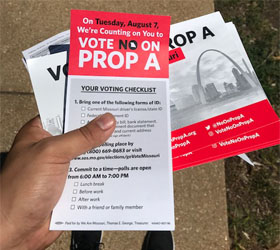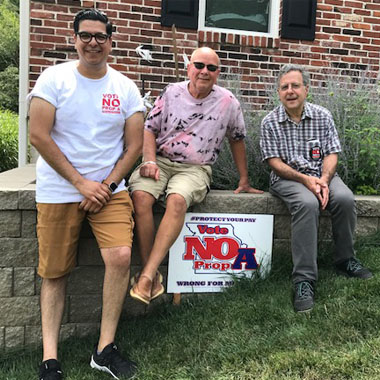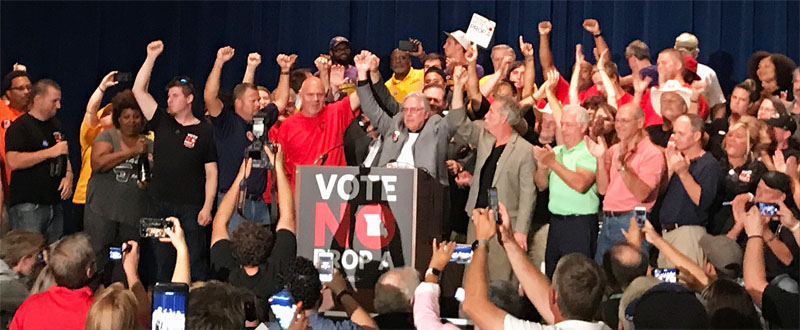OPINION
Missouri voters’ RTW rejection offers inspiration, hope for all
By ERIC GONZÁLEZ
 ST. LOUIS (Aug. 8, 2018) — Proposition A was a result of a petition process that aimed to repeal the “right to work (for less)” law, Senate Bill 19, passed by the Republican-controlled Missouri legislature in 2017. A “no” vote on Proposition A would stop the RTW law from taking effect. And by more than a two-to-one margin on Tuesday, Missouri voters said “NO” to RTW.
ST. LOUIS (Aug. 8, 2018) — Proposition A was a result of a petition process that aimed to repeal the “right to work (for less)” law, Senate Bill 19, passed by the Republican-controlled Missouri legislature in 2017. A “no” vote on Proposition A would stop the RTW law from taking effect. And by more than a two-to-one margin on Tuesday, Missouri voters said “NO” to RTW.
Twenty-eight states in the U.S. have passed these RTW laws, which block unions and employers from agreeing to union-security clauses and strip unions from their ability to collect dues from all members who benefit from the contract.
If Proposition A had passed, it would have cost jobs, weakened unions, and driven down wages for Missouri families. In fact, in states where RTW laws exist, workers make an average $8,740 less than in non-RTW states. This proposition would’ve made it harder for employers like Boeing, UPS, and Anheuser-Busch to negotiate with workers and effectively manage their business, while at the same time impacting the quality of life of communities throughout the state. This income, as little as it may seem to some, allows people to break away from the cycle of poverty that threatens the health and safety of 14 percent of families throughout the state living in poverty, or the 11% living without health insurance, in a state where the per capita income in the past twelve months is $27,000 (median household income is $45,200.)
Proposition A would have forced Missouri workers to accept lower wages and benefits, and broadened the gap between working families and wealthy CEOs, while weakening unions. However, even before election night, it was clear that Missouri residents were not buying what the out-of-state corporate interests were selling.
 I had the great privilege of traveling to Missouri to support the NO on Prop A effort and get out the union vote. I was joined by other union members from Washington state and all across the country — Arizona, California, Michigan, Ohio, North Carolina, Oregon, and from the National AFL-CIO office in D.C.
I had the great privilege of traveling to Missouri to support the NO on Prop A effort and get out the union vote. I was joined by other union members from Washington state and all across the country — Arizona, California, Michigan, Ohio, North Carolina, Oregon, and from the National AFL-CIO office in D.C.
It was oppressively hot and humid. My shirts were soaked through with sweat, and on Election Day, with rain as we experienced thunder and lightning in the morning. A tornado warning siren the day before turned out to be a monthly test alert, but it managed to kick in my fight-or flight instinct from my Omaha-Lincoln days.
But most of all, it was rewarding. The vast majority of the more than 300 doors in the greater St. Louis that I knocked on with my three different walking partners in the three days leading up to Election Day area truly inspired us — while offering to keep us hydrated.
“You’ve got two votes in this household.”
“My father helped defeat it in 1978, and I’m going to do the same in a couple days as a union retiree.”
And then there was the man who continued working on his roof while his kids played in the yard, in the middle of a 95-degree day, and said, “I don’t know why they keep trying that shit. They know we don’t support it.”
Those are just a few things we were excited to hear at the doors — from the video-capturing door bells in the cul-de-sac community of Broken Bow Drive in Wildwood, MO, to the non-working door bells in working-class neighborhoods of Ferguson, MO, we had the opportunity to connect and gain inspiration from those who are working to make a living and secure a future in a nation that has turned its back on workers, despite the promises made during the 2016 election season.
Proposition A was overwhelmingly defeated, 67.5% to 32.5% demonstrating the power of organized labor and community. (This picture above is from the election night celebration at the Sheet Metal Workers Local 36 Hall in St. Louis.) In a state that went 56 percent for Donald Trump in 2016, the resounding defeat of Prop A is not only a setback for the anti-worker movement, it is a referendum that America retains its interest in its own working class.
While we continue to build power as a labor movement by encouraging our own members to run for elected office, we need to continue going door-to-door and talking to voters, union and non-union (future union members), to protect our jobs, wages, and access to quality and affordable health care (social and economic prosperity). We must work to expand the boundaries of hope for those too timid to think their voice matters or that they don’t have a voice.
I believe we can continue to build our strength by increasing worker wages and benefits, establishing better health and safety protections on the job, and giving people the opportunity to save for a secure and hard-earned retirement. That will demonstrate the power of our unions.
 Eric González Alfaro is Legislative and Policy Director for the Washington State Labor Council, AFL-CIO.
Eric González Alfaro is Legislative and Policy Director for the Washington State Labor Council, AFL-CIO.






